Listening and Speaking: Furaha Children’s Home
Study this picture carefully and then read the sentences next to it.
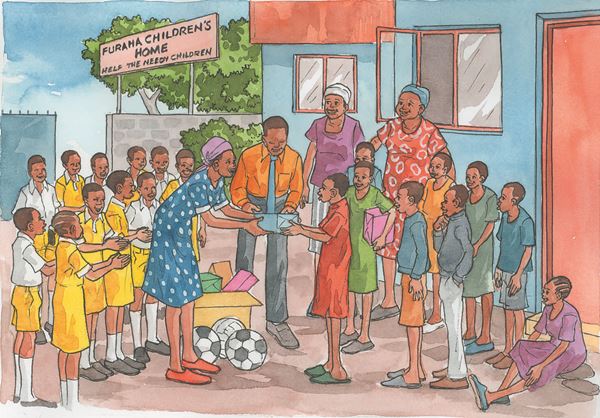
This is Furaha Children’s Home.
It houses many needy children.
For most of them, this is the only home they know.
Kind and generous people have put up this home.
It caters for the destitute, giving them hope and love.
Homes like this one need everybody’s support.
Activity 1
Answer these questions orally.
- What do you think is happening in the picture?
- How do you help needy people in your area?
- What can we do to help people who are less fortunate than ourselves?
- How can we build a happy, just society?
Listening and Speaking: A Better World
Read the following poem aloud.
We yearn for harmony and understanding,
We long for peace and joy,
Just as the deer pants for water,
But these we cannot enjoy,
If we are not honest and kind,
To all around us.
We experience much sorrow and misery,
We cry in pain and agony,
Like slaves yearning for freedom.
But we can restore hope and laughter.
If we can show love and goodness
To all around us.
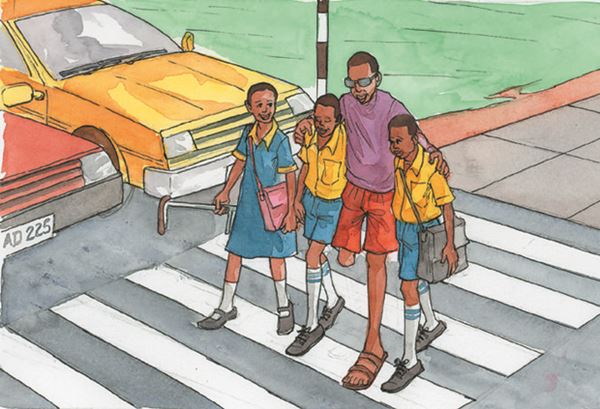
We witness much hatred and injustice,
We live in fear and uncertainty,
Like a gazelle pursued by a pack of hyenas.
But we can banish such from our midst
If we show respect and forgiveness
To all around us.
We see many sitting idly all day long,
We see demons of poverty creeping among us,
Like monsters about to devour us.
But we can transform our society and prosper
If we teach hard work and discipline
To all around us.
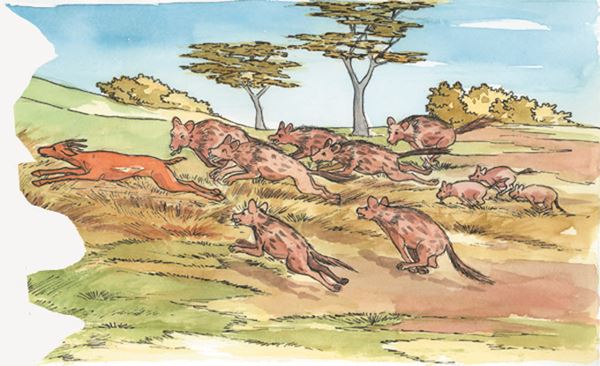
Activity 2
Answer these questions orally.
- What can we do in order to enjoy peace and harmony?
- Why do you think slaves are mentioned in the second stanza?
- Why should we forgive one another?
- Why do you think poverty is likened to demons and monsters?
Reading: Nyambane Meets his Match
Activity 3
Discuss these questions.
- What social values does your society consider important?
- What is chastity? Why should each one of us try to be chaste?
- To whom should we show respect? Why?
Read the following passage.
Nyambane Meets his Match
Nyambane was now in standard eight. He usually came top of his class and he had many friends. Being an outgoing, intelligent and fun-loving boy, he attracted friends the way light attracts moths at night. He had a smile and a cheerful word for everyone.
However, Nyambane did not feel as confident as he looked. His restless spirit and the desire to impress others controlled him. What he wanted above everything else was to be accepted and liked by other people. Of course others liked him, but he didn’t think so. He thought he had to do certain things to win their friendship. So, deep inside, Nyambane was unhappy.
One day, a girl in his class helped him to begin looking at things differently. Her name was Lucy and she was a beauty. To Nyambane, she was like an angel: humble, gentle and friendly. He liked her very much and tried all sorts of tricks to draw her attention. But Lucy did not seem to notice. During break, he would follow her and her playmates and watch their game from a distance. Then he began buying her sweets with money stolen from his grandmother. Nyambane would sneak into his grandmother’s house when she was out and remove some coins from the glass container where she kept her money. He thought giving sweets to Lucy and her friends would surely make an impact. And it did. They seemed grateful and Nyambane’s heart swelled with pride whenever Lucy gave him that sparkling smile of hers.
On their way to school one morning Lucy said, “Nyambane, I would like to talk to you at lunch time.”
Nyambane didn’t expect it, but he mumbled, “All right.” He wondered what she wanted to tell him. He waited anxiously and did not even concentrate on what the teacher was saying. The teacher noticed and asked him, “Nyambane, why are some people bald-headed?”
The answer he gave left everybody roaring with laughter. “Madam,” he said, “people who look bald-headed are not really bald. They just happen to be taller than their hair.” The teacher’s question helped him to stop daydreaming.
It was lunchtime and true to her word, Lucy walked up to him as soon as they stepped out of the classroom. “Nyambane,” she began as she and Nyambane sat down under a tree near their classroom, “I just want to ask you a question.”
“Yes....”
“Where do you get the money with which you buy us sweets?”
“Eh... eh... I... I... use my pocket money,” Nyambane stammered.
“Are you sure? Is that the truth?”
He suddenly felt guilty. Images of his old grandmother invaded his mind. Lucy seemed to see right through him. He couldn’t lie to her. “I lied to you, Lucy. I steal the money from Grandmother. I feel so ashamed of myself.”
“Why steal?”
“I just wanted to draw your attention. I’m sorry.”
“Nyambane, you don’t have to steal to impress me. I like you just the way you are. I don’t blame you because we all do wrong things. But please remember to be honest and to respect other people’s property, even your grandmother’s.”
“Thank you, Lucy. I won’t do that again. This evening, I will apologize to my grandmother, admit all the wrong I have done and ask her for forgiveness.”
“That’s the right thing to do, Nyambane,” Lucy said.
“I like you, Lucy. You are a good friend.”
“I like you too, Nyambane but no more sweets,” she smiled and off she went.”
Lucy’s words, hard words, yet spoken so gently, made Nyambane examine his life anew. It was surprising that so young a person could give him such good advice. He was amazed at Lucy’s goodness of heart: although she knew the truth about him, she still liked him. He marvelled.
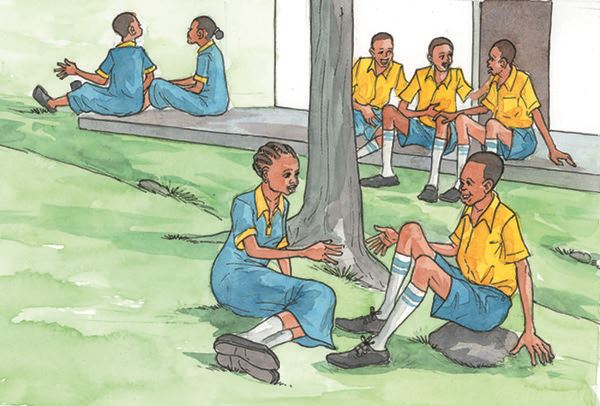
A few days later the school was having the annual sports day. The chief guest spoke to everyone present about the need to exercise morality and self-control. He said that people who have good morals treat others fairly and shun behaviour that offends or embarrasses others. “Self-control helps us to resist temptations to do or say things we may later regret. If we want to live in a peaceful society, then we must obey the law of the land and prove to be trustworthy. We must not forget to love one another because love is the greatest virtue,” he concluded.
These words reminded Nyambane of what Lucy had told him. A few days earlier, he had sought his grandmother’s pardon and she had forgiven him. He felt like a new person. Indeed he was a new person and people had begun to notice the difference. Nyambane felt happier than ever before.
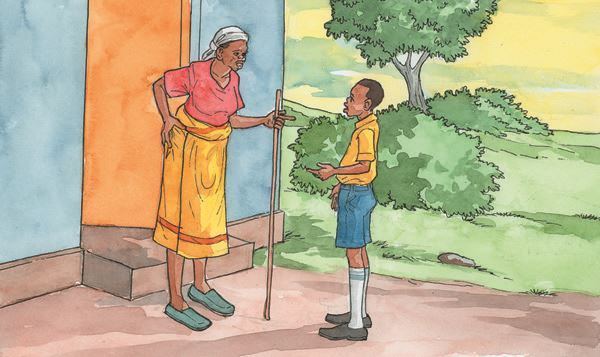
1. Why does the author mention moths in the first paragraph?
- To show that Nyambane’s friends behaved like insects.
- To remind readers of something they have witnessed.
- To emphasize how easily Nyambane made friends.
- To prove that Nyambane had power just like light.
2. What drove Nyambane to do the things he did according to the information given in the second paragraph?
- He was unable to believe that people liked him.
- He wanted to hide what he was feeling inside.
- He assumed what he did would make him happy.
- He thought people would accept and like him.
3. Which one of the following statements best proves that Nyambane desperately wanted to win Lucy’s attention?
- He even stole money to please her.
- He compared her to an angel.
- He tried to attract her attention daily.
- He followed her everywhere.
4. Before Lucy talked to him, Nyambane seemed to lack
- self-control.
- dignity.
- respect.
- common sense.
5. Which of the following is not a good summary of Lucy’s character?
- Humble, gentle and beautiful.
- Humble, gentle and friendly.
- Humble, gentle and courageous.
- Humble, gentle and honest.
6. Nyambane’s answer to the teacher’s question shows that he was
- confused.
- daydreaming.
- inattentive.
- humorous.
7. Why do you think Nyambane stammered when Lucy asked him where he got the money?
- He did not want to tell her.
- He did not expect such a question
- He did not have a ready answer.
- He did not know how she would behave.
8. The word marvelled can be replaced by
- wondered.
- thought.
- wandered.
- considered.
9. How did Lucy’s advice transform Nyambane’s life?
- He asked his grandmother to forgive him.
- He realised he could not lie to Lucy.
- He did not have to pretend any more.
- He began to feel like a new person.
10. Which of the following would be the best summary of this passage?
- Lucy helps Nyambane to face reality.
- Doing right leads to happiness.
- You should not steal to impress others.
- We should not judge other people.
Activity 4
Discussion
Do you think it was right for Lucy to speak to Nyambane about his behaviour? Give reasons for your answer.
Build your Vocabulary
Words | Opposites |
outgoing | |
cheerful | |
humble | |
swell | |
sparkling | |
guilty | |
self-control | |
shun |
self-control, humble, outgoing, guilty, sparkling, swell, cheerful, shun
Life can be much more interesting if we learn to get along with those around us. We should try to be and because these qualities will win us friends. Just walk around with a smile and notice how even the dullest faces will brighten. We must also be and able to exercise . In addition, we should gossip because it kills relationships. In fact those who are of backbiting others should change their ways. Finally, we must overcome jealousy. When our friends succeed, our hearts ought to with pride.
